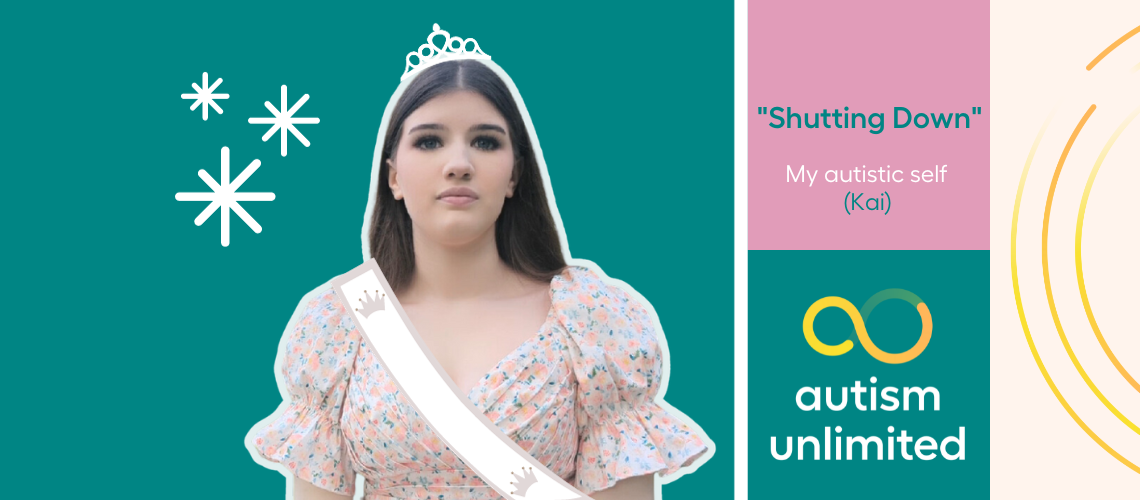Shutting Down - Kai

Shutting Down – Kai's Experience
Sixteen-year-old Kai has ADHD and is autistic, non-binary and the proud titleholder of Teen Miss Diamond United Kingdom 2023/24. Following their national success, Kai will go on to compete in Orlando next summer.
Pageants can present extra challenges with sensory processing, anxiety, and overwhelm, making them a daunting prospect for some autistic individuals. However, Kai demonstrates how autism does not need to be a barrier if the right support is in place.
Kai is passionate about dispelling myths and stereotypes about autism, using their platform to shine a light on neurodiversities in girls and non-binary individuals.
After making contact with our volunteers at the Bournemouth Air Festival earlier this year, they wanted to get involved with our campaign and share their experience with ‘shutting down’.
What causes you to shut down?
Some autistic people struggle to process sensory input, which can make everyday living highly stressful. Too much information, including lights, sounds, and smells, can overload the brain and overwhelm the individual.
Kai said: “Usually when I shut down, it’s because I’ve gotten overwhelmed sensory-wise, which means maybe it’s really loud, maybe there’s too much I’m having to think about.”
Their sensory triggers include many ‘natural noises’, which can range from birds tweeting and the wind to television and background chatter. When these sounds surround our everyday experiences, it can be difficult to escape and cause a great deal of anxiety.
Despite their best efforts to push through the sensory influx, it doesn’t always work. Instead, Kai might become completely overwhelmed and respond by ‘shutting down’.
They continued: “Sometimes, if I get really overwhelmed and shut down, something that makes me feel a lot worse is actually the texture of my clothing, which is why I usually try to stick to joggers and comfortable shirts.”
What do you experience when shutting down?
Shutting down can be the brain’s way of coping with extreme stress. When someone becomes completely overwhelmed, they might withdraw from the world to prevent further panic and alleviate anxiety.
Kai said: “Imagine there’s just someone screaming at you and you start to cry. Instead of crying, I just close off and it feels like, if I even move, or breathe, or talk, it’s going to make the whole world collapse around me.”
“I feel like I have no other choice but to focus in on myself. It’s almost like an accidental meditation where I have no other choice but to hold it all in.”
They retreat into themselves and dissociate from the environment around them. It serves as a method of protection to block out any further stimuli or demands. They may appear unresponsive, unable to explain what they’re going through.
Kai continued: “A lot of the time that also means I can’t speak – sometimes it’s that I choose not to speak because it’s overwhelming, and sometimes it’s also because speaking just is impossible.”
What helps you?
Everyone is different and what works for each person will vary. Most of the time, Kai prefers to be left alone to calm down. Other times, the presence and support of another person can be helpful.
They said: “A lot of the time, it means I have to close my eyes, curl up into a corner and have a hug. For me personally, I do really like the pressure of hugs. When I’m with my mum, I lie down and she puts all her body weight on me.”
“It can really help – it’s like bringing your focus all to one sensation rather than everything going on around you. And it’s a lot more relaxing and calming than sitting in a quiet room sometimes.”
If Kai shuts down in public without any family, the best thing to do is to find some headphones and move to a quiet area to reduce the sensory input around them.
They added: “You can’t just assume when something is going to happen, it can take place at any point, which can be quite annoying because you can’t guess when it’s going to happen next.”
How do you manage it with your pageantry?
A pageant environment can pose unique challenges with sensory sensitivities and social demands. When taking to the stage, contestants are surrounded by bright lights, loud noises, and large crowds of people.
“When I get onto stage or I do my private interview, it can be really, really scary because you’re talking to people you don’t know, you’re being filmed, and you’re being watched by strangers.”
“A lot of the time I can feel really vulnerable and it’s very loud. But there’s not really much I can do, but I do have to say, people are so supportive about it.”
Kai wears clear headphones on stage to stop sounds from becoming too overwhelming. But other than that, there’s not much they can do. It’s difficult to navigate these challenges when certain rules and restrictions are in place.
They said: “I can’t wear big headphones on stage, I can’t wear joggers and a t-shirt because that obviously does not fit the dress code. But a lot of the time, because I know I’m doing something good, I don’t get as nervous because I know I’m helping people by bringing awareness.”
“It’s not out of the ordinary for autistic people to do pageants. I, myself, know so many people who are neurodiverse and compete in pageantry. There is quite a lot of support if you go with a good system, a lot of the directors are actually really supportive and will help support everything you need.”
Understanding and empathy from organisers can help to create an inclusive space where autistic people can share their needs and feel supported.
“You need to be prepared for the worst, anything can happen and it is quite hard because a lot of the marking is based on eye contact and confidence. “
“The best thing I’ve found is that you stare at them like they’re a random teddy on your bed and it really helps.”






